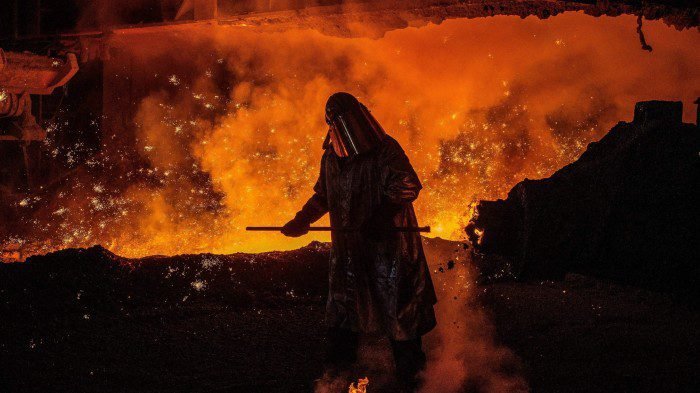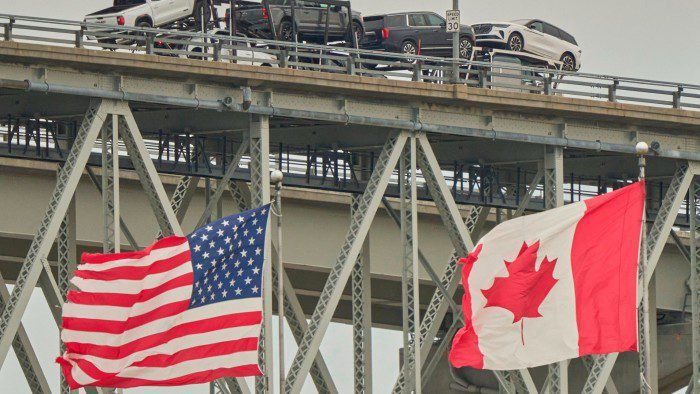Unlock the Editor’s Digest for free
Roula Khalaf, Editor of the FT, selects her favourite stories in this weekly newsletter.
British steelmakers are racing to reconfirm orders with US customers at a 25 per cent tariff rate, as they warned of huge uncertainty for the industry despite being spared President Donald Trump’s doubling of import tariffs to 50 per cent.
Industry executives on Wednesday urged the government to finalise details of the UK’s trade deal with the US, and said many had deferred or cancelled shipments over concerns that they might have to pay the higher levy.
A warning from Trump that the US might yet increase its tariffs on the UK “on or after 9 July” unless the UK concludes the trade deal on terms acceptable to Washington has only added urgency to the situation.
Gareth Stace, director-general of trade body UK Steel, said the government needed to “apply rocket boosters” to its negotiations with the US and finalise a deal that would replace tariffs with tariff-free quotas.
“Given it takes three weeks [for shipments] to get across the Atlantic . . . the ninth of July is not that far away,” Stace added.
William Bain, head of trade policy at the British Chambers of Commerce, said the “continuing shifting sands around tariffs” were creating “more uncertainty for businesses globally and weighing heavily on growth”.
UK chancellor Rachel Reeves, speaking in Rochdale on Wednesday, said Trump’s 50 per cent steel tariffs would apply “to every country in the world apart from Britain” and that the carve-out was testament to the hard work of Prime Minister Sir Keir Starmer and business secretary Jonathan Reynolds.
But she added: “We have 25 per cent tariffs on steel today, but we have a deal to bring them down to zero. We are still the only country that has done a deal with the US.”
Starmer told the House of Commons on Wednesday that the UK expected tariffs to come down to zero within “a couple of weeks”.
“We’re the only country in the world that isn’t paying the 50 per cent tax on steel and that will be coming down,” Starmer said. “We are working on bringing it down to zero, that is going to happen.”
“We have a deal, we’re implementing it and within a very short time I’m very confident we will get those tariffs down in accordance with the deal.”
The US is the UK’s second-most important export market for steel after the EU, worth about £400mn a year. Industry leaders on Wednesday expressed growing frustration with the delay in getting a deal over the line.
Philip Jackson, managing director of Yorkshire-based Bright Steels, which specialises in the bright drawn steel bars used in the automotive, hydraulic and power industries, said the uncertainty surrounding Trump’s July 9 deadline was causing “apprehension” among customers.
“While the removal of the 50 per cent is positive news, it’s still a totally confusing situation,” he said. “We need clarification from the UK government . . . that this trade deal will be implemented at this time.”
Liam Bates, head of the Marcegaglia Stainless Sheffield works, one of the UK’s biggest producers, said the news of the UK carve-out was positive as a 50 per cent levy would have “taken us out of the US market”. The company, part of the giant Italian industrial conglomerate of the same name, exports semi-finished steel to a processing facility in Richburg, South Carolina.
“Moving back to 25 per cent gets us back to an uncomfortable equilibrium where, at a stretch, the supply chain can swallow it,” said Bates. Nevertheless, it was important to get clarity from the UK government on the timing of the trade deal.
US customers, said Bates, were “still back to a period of confusion over ‘when should we buy’” given that tariffs could be back to zero per cent soon.
Industry executives said one of the sticking points in negotiations with the US is whether British steel exports that include raw materials from other countries will be included in the new tariff-free quotas.
It is an issue that will have financial implications for Tata Steel. After closing its two blast furnaces in Port Talbot in Wales last year, the Indian-owned group has been importing steel from India and the Netherlands for processing in the UK.
Tata on Wednesday said it remained hopeful that a zero tariff deal would be reached.


